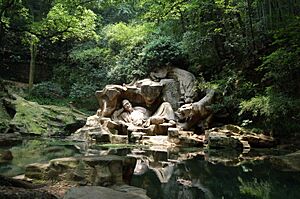Ji Gong facts for kids
Quick facts for kids Ji Gong |
|
|---|---|
| 濟公 | |

Tiger spring, the burial place of monk Jigong
|
|
| Religion | Chan Buddhism |
| Temple | Lingyin Temple |
| Other names | Chan Master Daoji |
| Monastic name | Daoji |
| Personal | |
| Home town | Tiantai County, Taizhou, Zhejiang, Southern Song |
| Born | Li Xiuyuan 22 December 1130 Tiantai County, Taizhou, Zhejiang, Southern Song |
| Died | 16 May 1209 (aged 78) Jingci Temple, Hangzhou, Southern Song |
| Parents |
|
| Senior posting | |
| Period in office | Southern Song |
| Religious career | |
| Teacher | Huiyuan |
| Ji Gong | |||||||||||||||||||
|---|---|---|---|---|---|---|---|---|---|---|---|---|---|---|---|---|---|---|---|
| Traditional Chinese | 濟公 | ||||||||||||||||||
|
|||||||||||||||||||
| Chan Master Daoji | |||||||||||||||||||
| Traditional Chinese | 道濟禪師 | ||||||||||||||||||
|
|||||||||||||||||||
| Li Xiuyuan | |||||||||||||||||||
| Traditional Chinese | 李修緣 | ||||||||||||||||||
|
|||||||||||||||||||
Daoji (Chinese: 道濟, 22 December 1130 – 16 May 1209, born Li Xiuyuan), popularly known as Ji Gong (Chinese: 濟公), was a Chan Buddhist monk who lived in the Southern Song. He purportedly possessed supernatural powers through Buddhist practice, which he used to help the poor and stand up to injustice. However, he was also known for his wild and eccentric behavior and didn't follow Buddhist monastic rules. By the time of his death, Daoji had become a legend in Chinese culture and a deity in Chinese folk religion. He is mentioned by Buddhists in folktales and kōans, and sometimes invoked by oracles to assist in worldly affairs.
History
Originally named Li Xiuyuan, Jìgōng (濟公) was born to a former military advisor Li Maochun and his wife Lady Wang in 1130 CE (other accounts say 1148). After the death of his parents at the age of 18, Li was sent to Hangzhou and was ordained as a monk in Lingyin Temple, a temple of the Chán (Zen) school. He was mentored by the Vinaya master Huiyuan and was given the monastic name Dàojì (道濟, which could be interpreted as "Helper on the Way"). Unlike traditional Buddhist monks, Dàojì did not like following traditional monastic codes. He had a penchant for openly eating meat and drinking wine; his robes were often tattered and dirty from traveling from place to place. However, Dàojì was kindhearted and was always ready to lend a helping hand to ordinary people. He would often treat the sick and fight against injustice. The monks, bewildered and fed up with his behavior, expelled Dàojì from the monastery. From then on, Dàojì roamed the streets and helped people whenever he could.
According to legend, while cultivating Buddhist practices, Dàojì attained supernatural powers. Many who noticed his eccentric yet benevolent and compassionate nature began to think that he was the emanation of a bodhisattva, or the incarnation of an arhat. He was widely recognized by people as the incarnation of the Dragon Subduing Arhat (降龍羅漢, Xiánglóng Luóhàn), one of the Eighteen Arhats. Later he became known as Jìgōng (济公, "the Honorable Helper"), a title of respect derived from his monastic name, Dàojì (道济).
Toward the end of his life, he stayed at Jingci Temple, and passed away on the 14th day of the 5th lunar month (May 16th, 1209), around the age of 79 (or 61 according to other chronicles). Later syncretic Taoism began to revere Jìgōng as a deity. Not long after that, Chinese Buddhist institutions began to recognize his compassionate efforts, and was incorporated into Chinese Buddhism. He is also featured as an interlocutor in many classic kōans of the Chán (Zen) school.
Since at least the 1869s, mediums in China have claimed to receive texts from Jìgōng through spirit writing, later called Fuji (扶乩/扶箕 fújī). These messages led to a further development of Jìgōng worship, which was actively promoted by the monk Fǎlún (法輪) at Hupao Temple (虎跑寺, Hǔpǎo Sì) in Hangzhou, where Jìgōng’s grave is located. The channeled messages gradually acquired a moralistic tone, recommending charitable activities. Jìgōng’s messages received through 'spirit writing' played a role in the establishment of the Benevolent Relief Society (救濟善會, Jiùjì Shànhuì), whose leaders later participated in the foundation of the Red Cross Society of China.
A new Buddhist movement, the Hong Kong-based Tung Cheng Yuen Buddhist Association (Chinese: 東井圓佛會; pinyin: Dōngjǐng Yuánfú Huì), worship Jìgōng. Yiguandao has also adopted him into their pantheon of deities, citing Zhang Tianran, contemporary founder of the Yiguandao, as his reincarnation.
Depiction
Ji Gong can usually be seen smiling in tattered monastic robes and oversized bead necklaces. He usually carries a bottle of wine in his right hand, and a fan in his left hand. He wears a hat with the Chinese character Fo (佛), meaning "Buddha". He can also be seen holding his shoes in his right hand. Because of his carefree nature, he is rarely ever shown with a serious facial expression.

